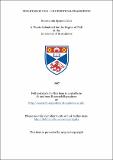Philetas of Cos : the poetical fragments
Abstract
The greatest impediment in our effort to reconstruct the history of Greek literature of the 4th c. B.C. is the almost complete loss of important poets such as Antimachus of Colophon, a loss which leaves us in the dark as to the conditions that led to the 3rd c. B.C. renaissance. In the times around 300 B.C. leading figures were active in the SE Aegean, the most prominent of whom was Philetas of Cos. Ptolemy I entrusted him with the tutorship of his son Ptolemy II. Philetas was highly esteemed by his compatriots who honoured him with a statue, and by the avant-garde among Hellenistic poets including Callimachus and Theocritus. He wrote hexameters (Hermes), narrative elegy (Demeter), Epigrams and Paegnia and perhaps a Telephus. His Ataktoi Glossai, the first ever collection of recondite dialect vocables, became instantly renowned. But his poetiy did not survive long and is now almost entirely lost; no more than 50 lines survive along with 31 second hand entries of his Atakta mainly from Athenaeus. These were last published and studied by G. Kuchenmiiller in a Berlin 1928 thesis written in Latin, a work nowadays not easily accessible. This new approach to the scanty poetical remains of Philetas brings the study of this key figure up to date, takes into consideration material published since the twenties (including two fragments, three important testimonies, Hellenistic fragments which have become available from papyri, verse-inscriptions and inscriptions from Cos). Evidence from various sources is adduced to reconstruct Philetas' poems (particularly his "Coan" Demeter, to which most of the surviving fragments are attributed) and the key epigram fr. 27 is newly interpreted to show Philetas a Callimachean before Callimachus. A detailed commentary elucidates the wide range of Philetas' sources of inspiration and the largely neglected influence of his work, often followed up to Imperial times. A list of Alleged Testimonia and another of Alleged Ascriptions are provided to discuss pseudo-Philetan references and material.
Type
Thesis, PhD Doctor of Philosophy
Collections
Items in the St Andrews Research Repository are protected by copyright, with all rights reserved, unless otherwise indicated.

